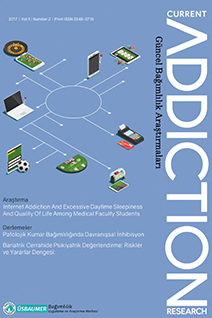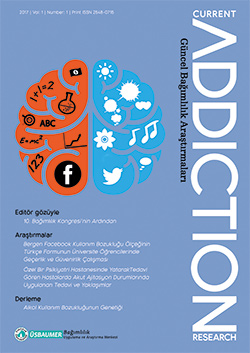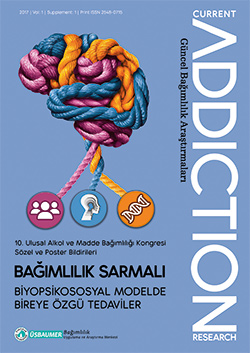Years
2024
Categories
Authors
ARTICLES
Original Article
Özge Nur Kutluer,Ceylan Ergül Arslan
2024, 8(1), s:5-12
Objective: In this study, it was planned to investigate the effect of traumatic events experienced by individuals diagnosed with alcohol and substance use disorder on the severity of addiction.
Method: The participants of this study are 50 people who applied to NPİSTANBUL Brain Hospital Amatem service for the treatment of substance use disorder. Of these 50 participants, 47 are men and 3 are women. The research data were collected through the scales given to the survey participants. The Addiction Profile Index (BAPI) was applied to the participants to measure the severity of addiction, and the Traumatic Experiences Scale (TEC) was applied to measure their traumatic experiences.
Results: In the study, the level of significance was taken as 0.05 and 0.001. A moderately significant positive correlation was found between the participants' traumatic experiences scores and their total addiction index scores.
Conclusion: According to the findings obtained in the study, the addiction index diagnosis sub-dimension scores were higher in male participants compared to female participants. It has been shown that childhood traumas impair neural structure and function, making individuals more susceptible to cognitive deficits and psychiatric diseases, including substance abuse (18). Therefore, it is important to evaluate and consider the history of childhood traumatic experiences in relation to substance abuse. The results obtained emphasize the importance of traumatic experiences in addictions to a degree that can contribute to the applications to be developed for addiction treatment and to future research.
Original Article
İrem Teke Bulut,Ceylan Ergül Arslan
2024, 8(1), s:34-44
Objective: In this study, it was aimed to Decipher the relationship between the emotion regulation difficulty levels and psychological well-being levels of individuals who use tobacco.
Method: The study group of this study was composed of people between the ages of 18-65 Dec. The research data were collected by reaching 212 people virtually through a survey. The data were sent to the participants online with the ‘Sociodemographic Information Form’ prepared by the researcher, the ‘Emotion Regulation Difficulty Scale’ (DERS) and the ‘Psychological Well-Being Scale’ (PWB) scales and they were asked to answer and the answers were evaluated and collected.
Results: Within the scope of the study, the data of 212 participants who smoked were examined. The sociodemographic variables of the participants were compared with their emotion regulation difficulties and psychological well-being levels. In addition, the relationship between emotion regulation difficulties and psychological well-being levels of smokers was examined. According to the findings obtained in the study, significant differences were found in the scores of psychological well-being and difficulties in emotion regulation in terms of gender, marital status, employment status, income level, psychological disorder, presence of a smoker in the family, reason for smoking.
Conclusion: In addition, a negative, moderate and significant relationship was found between psychological well-being and difficulty in regulating emotion in smokers. The total score of emotion regulation difficulty predicts psychological well-being scores negatively and significantly. The model explains the variance by 14%. According to the findings regarding the prediction of psychological well-being scores by sub-dimensions of emotion regulation difficulties, it was found that difficulty scores in developing emotion regulation strategies predicted psychological well-being scores negatively and significantly. The model explains the variance at a rate of 16%.



 2. Sayı
2. Sayı
 1. Sayı
1. Sayı
 Ek Sayı
Ek Sayı







